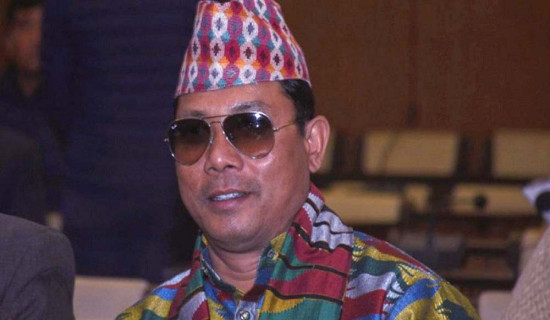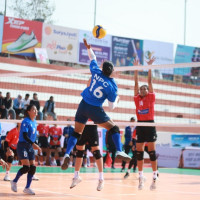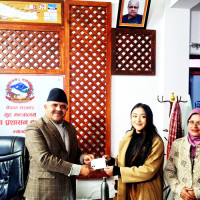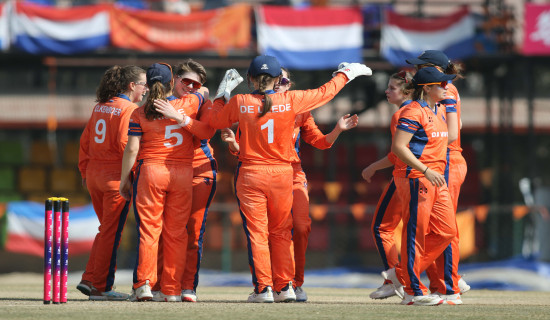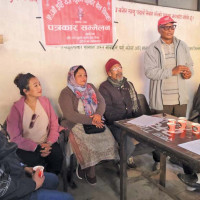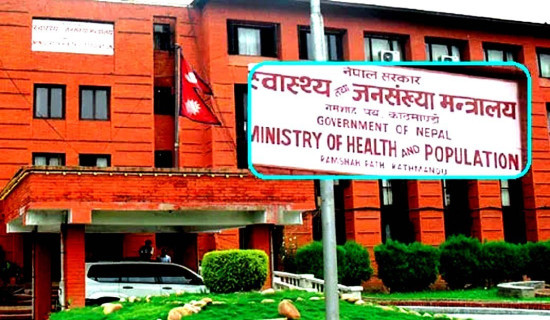- Friday, 23 January 2026
Complexities of relationships and its detrimental effects: Pagla Ghoda
Kathmandu, Jan. 12: Four men from different walks of life gather for the funeral of a girl who has committed suicide.
While the girl’s body is burning on the pyre, the four men indulge in cards and drinks, attempting to explore the mystery of her death. The girl, now a ghost, appears on the stage during the cremation and tries to communicate with the men about their love mysteries.
This is how the play ‘Pagla Ghoda (The Wild Horse) begins.
Amidst the somber atmosphere of a crematorium ground, the four men gradually reveal the complexities of their own love stories, sharing the painful narratives of how they forever lost their loves and now grapple with haunting guilt.
The play, currently being staged at Mandala Theatre, delves into the complexities of relationships and the detrimental effects of deep-rooted societal and patriarchal ideologies.
The play revolves around four middle-class cowardly men who love their girls but can’t accept going against societal norms because of their fearful reasons.
Renowned Indian theatre artist and director Badal Sircar penned the play ‘Pagla Ghoda’ in the 1960s. Translated by Shiva Khand Thakuri into Nepali, the play is directed by Ghanashyam Shrestha while Aashant Sharma supervised the script.
Sircar sought to explore the realities of society approximately six decades ago through his play.
Through this play, Sircar delved into the multifaceted aspects of society, shedding light on how women were treated in the name of culture and belief. His examination exposed the prevailing dominance of males over females, often leading to circumstances where women felt compelled to sacrifice their lives.
Ironically, the societal dynamics observed six decades ago remain prevalent even in today’s society in various forms.
The play serves as a poignant reflection of the enduring suffering that women undergo due to embedded patriarchal norms.
In the narrative, Shekhar, a middle-class young man portrayed by Bijay Anand Tamrakar, is deeply in love with Sapana. However, he tragically forces Sapana into marrying his cousin Pradeep under the false belief that Pradeep reciprocates her feelings. This forced marriage leads to a tragic ending, with Sapana taking her own life.
Another couple, Ashok (Bimba Adhikari) and Maya, represents the clash between modernity and tradition. Maya, hailing from a wealthy background, falls in love with Ashok, a normal teacher. However, Ashok pressures her to follow traditional patriarchal norms, which leads Maya to commit suicide.
Rabi (Pramod Agrahari), a contractor, and Laxmi share a deep love for each other. However, he refuses to acknowledge their relationship to society, fearing the loss of his job. This ultimately results in Laxmi’s heartbreaking demise.
The storyline also encompasses the story of a woman left alone on her wedding day, dedicating herself to the care of her paralysed father.
Despite her devotion, she becomes increasingly frustrated with her life. In her desperation, she encounters Kapil, portrayed by Ashanta Sharma, and asks for poison to end her life. Kapil, profoundly in love with her, pleads for seven days to change her mind, but tragically, she takes her own life before that time elapses.
The unfolding events reveal the deep-seated traumas and struggles within the souls of these four men, each narrating their stories through poignant memories.
All four dead girls’ roles are played by actress Malika Mahat.
Although it is her first theatrical performance, she has tried her best to embody all four characters.
The other four men have also done commendable work in the play.
The title ‘Pagla Ghoda’ is a metaphor to convey its narrative. It symbolises the chaotic and unpredictable nature of love.
The parallel narratives in the play make the audience curious multiple times, and the love mysteries and twists and turns also engage the theatregoers in the play.
The play will be staged in Mandala Theatre till January 20.



